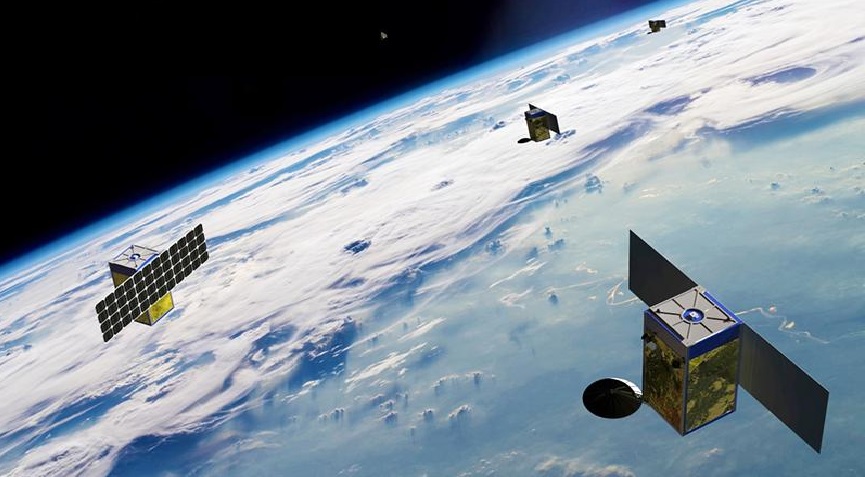Thales Alenia Space Expands IRIDE Constellation with Six Additional SAR Satellites Under ESA Contract

Thales Alenia Space, a collaboration between Thales (67%) and Leonardo (33%), has taken another pivotal step in bolstering Italy's Earth observation capabilities with the expansion of the IRIDE constellation. The company recently signed a €107 million contract with the European Space Agency (ESA) to deliver six more radar-based satellites. This addition marks a key phase in Italy's ambitious project to establish one of the most advanced satellite constellations in Europe. Managed by ESA in collaboration with the Italian Space Agency (ASI), the IRIDE project is central to Italy's National Recovery and Resilience Plan (PNRR).
IRIDE is not just another constellation but a groundbreaking initiative designed to enhance Italy's capacity for Earth observation. When fully operational by 2026, the constellation will comprise 13 satellites, 12 of which will utilize Synthetic Aperture Radar (SAR) technology. SAR is a vital tool in Earth observation due to its ability to capture high-resolution images regardless of weather conditions or light levels. The final satellite in the constellation will employ optical technology, rounding out a system that offers comprehensive monitoring capabilities. This fusion of radar and optical sensors allows for unprecedented accuracy and frequency of data collection, especially crucial for environmental and civil applications.
The newly ordered batch of satellites will be built on Thales Alenia Space’s innovative NIMBUS (New Italian Micro Bus) platform. NIMBUS is a small but powerful platform designed for high-revisit and high-capacity constellations like IRIDE. The platform is engineered for efficient production without sacrificing performance, ensuring that Italy can deploy its satellites quickly and effectively. Thales Alenia Space has positioned NIMBUS as a “game-changer” in small satellite technology, with the ability to capture detailed radar images of Earth in near real-time, even in the face of clouds, darkness, or other challenging conditions.
The €107 million contract is part of the broader vision to strengthen Italy’s ability to monitor its environment, protect its coastlines, and ensure public safety. One of the IRIDE constellation’s main objectives is to provide data for crucial public services, including monitoring air quality, tracking weather patterns, and protecting critical infrastructure. For example, the data can be used to detect deforestation, track pollution levels in real-time, and assess changes in land use, making it a vital tool for Italy’s Civil Protection agency.
This investment is not just in hardware but also in Italy’s future leadership in space technology. Thales Alenia Space has committed to building the new satellites in Italy, leveraging the expertise of the country’s small and medium-sized enterprises (SMEs) to complete the construction and integration of the constellation. This focus on local manufacturing will further boost Italy’s growing reputation as a leader in space technology.
An exciting feature of the IRIDE constellation is its hybrid structure, which combines the strengths of SAR and optical technologies. In addition to the radar-equipped satellites, Thales Alenia Space will build an optical satellite, with the optical payload developed by Italian companies Media Lario and TSD-space. This hybrid approach will deliver richer, more detailed data, giving Italy unparalleled flexibility in its Earth observation capabilities.
Beyond the immediate benefits to Italy, the data gathered from the IRIDE constellation will also support Europe’s broader Earth observation efforts. The IRIDE system is designed to integrate with other European observation programs like COSMO-SkyMed Second Generation, Prisma, and the Copernicus program. This integration will provide European nations with enhanced capabilities for environmental monitoring, disaster response, and climate change mitigation.
Thales Alenia Space is dedicated to pushing the boundaries of Earth observation technology. As Giampiero Di Paolo, Senior Vice President for Observation, Exploration, and Navigation at Thales Alenia Space, explains, “With the IRIDE constellation, we are reinforcing our capabilities in delivering cutting-edge radar and optical solutions for Earth observation. This program will offer vital data to support environmental monitoring, civil protection, and public safety.”
The IRIDE project is set to revolutionize how Italy monitors its environment, providing real-time data that can be used across sectors—from governmental agencies to commercial enterprises. As part of a broader strategy, Thales Alenia Space’s involvement in IRIDE reflects its commitment to building integrated “ALL-IN-ONE” solutions that fuse radar and optical technologies. This dual capability ensures that Italy remains at the forefront of the global space industry.
Looking ahead, the IRIDE constellation will not only support researchers and public administrations but also provide new opportunities for commercial applications in the geospatial sector. Start-ups and SMEs specializing in Earth observation will gain access to an unprecedented amount of data, driving innovation in everything from environmental science to urban planning.
In short, the IRIDE constellation, supported by Thales Alenia Space’s advanced satellite technology, is set to become a cornerstone of Italy’s space ambitions. It will empower Italy to take full control of its environmental monitoring efforts, safeguarding its natural resources and infrastructure while also contributing valuable data to international efforts to better understand our planet.


